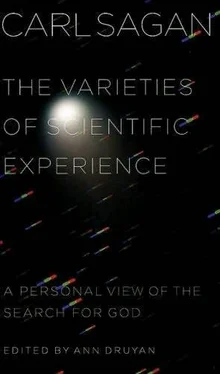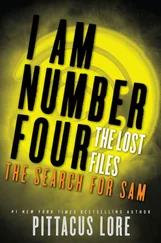Well, I don't claim that this is the same as all aspects of the religious experience. I think there is as much difference between the religious experience and the bureaucratic religions as there is, say, between sex with love and sex without love. And of course humans have added something profound and beautiful in both cases to the molecular reflex. Perhaps this account will sound tasteless or unpalatable to many, and if so I apologize. But if we treat the question of the origin of religion and the religious experience as a scientific question, then we must ask, "What essential aspects of the religious experience are left out by this hypothesis?" and note that it is at least in principle testable by finding the theophorin, and you could then of course see a large number of controlled experiments to test that out in great detail.
Now, whether or not this explanation is right, there is no question that religions have historically played the role of making people contented with their lot. And it is customary even today to argue that the actual truth or falsity of the religious doctrine does not matter so much as the degree of social stability it brings about. People who through no fault of their own have much less in the way of material goods or respect in a society are told in many religions, "It doesn't matter in this life. Yeah, it looks like you're getting a bad deal, but this is just the twinkling of an eye. What really matters is the next life, and there an implacable cosmic justice awaits you. All those who seem unjustly enriched by the rewards of this life will be punished greatly in the next, whereas you who are the hewers and carriers, the humble people who are content with your lot in this life, will be raised to glory in the next."
Maybe it's true. But it's not hard to see that such a doctrine would be very appealing to the ruling classes of a society. It calms any revolutionary tendencies or even mild complaints and therefore has powerful utility. Many societies, for this reason alone, encourage the contentment with your lot that the religious promise of heaven affords.
Many religions lay out a set of precepts-things people have to do-and claim that these instructions were given by a god or gods. For example, the first code of law by Hammurabi of Babylon, in the second millennium B.C., was handed to him by the god Marduk, or at least so he said. Since there are very few Mar-dukians today, perhaps no one will be offended if I suggest that this is a bamboozle, that it's a pious hoax. That if Hammurabi had merely said, "Here's what I think everybody ought to do," he would have been much less successful, although he was king of Babylon, than if he said, "God says you should do this."
I recognize that the next step, saying that other lawgivers who are better known today are in the same situation, might produce some degree of outrage at the impiety, but I ask you to nevertheless think it through. Is it not likely that in earlier times, in less sophisticated circumstances, those who wished to impose a certain set of behavioral tenets claimed that they had been handed them by a god or gods.
Now, as soon as you say that religious belief and conventional morality are necessary to keep the society going, you raise the suspicion that these are tools by which those who control the country tend to keep everybody else in line.
And I would like to jump headfirst into a contemporary issue just to make this a little less abstract. Everyone knows about what's going on in apartheid South Africa. I would merely like to draw your attention to something recently produced, called the Kairos Document, derived from a Greek word meaning "the moment of truth." It was written by committed Christians of many races who are opposed to the apartheid system in South Africa. And in the context of what we were just talking about, let me just paraphrase a couple of paragraphs to get a feel about this. It says that state theology in South Africa employs almost exclusively the apostle Paul's view of the state as a power "ordained by God" and commanding obedience. It comes from the remark, "Render unto Caesar what is Caesar's," without there being any detailed explication as to how you go about doing that. The regime elevates the concept of law and order above every other sort of morality. It goes on to state that in the present crisis and especially during the State of Emergency, "State Theology" has tried to reestablish the status quo of orderly discrimination, exploitation, and oppression by appealing to the conscience of its citizens in the name of law and order.
And then later on,
This God is an idol. It is as mischievous, sinister and evil as the idols that the prophets of Israel had to contend with… Here we have a God who is historically on the side of the white settlers, who dispossesses black people of their land and gives the major part of the land to his "chosen people."… It is the God of teargas, rubber bullets, sjamboks, prison cells and death sentences. Here is a God who exalts the proud and humbles the poor, the very opposite of the God of the Bible……
How rare it is that religions-especially established religions- take the lead in confrontation with the civil authorities when a monstrous injustice is being done. How often it is that the religious authorities take the safe way and temporize or talk about the afterlife or talk about moving slowly or talk about this not being the proper function of religion. And then, on the other side, how often is it that the established religions make authoritative pronouncements on matters of science, matters of fact, matters where they run the desperate risk of being disproved by the next discovery?
This idea was very nicely summed up by Pierre-Simon, the marquis de Laplace, one of the great scientists in the post-Newtonian age, and also a partisan of the French Revolution. In his System of the World, in 1796, he said, "Far from us be the dangerous maxim that it is sometimes useful to mislead, to deceive, and enslave mankind to ensure their happiness."
Well, I have tried in this talk to give a further sense of how it is possible in various sorts of ways, ranging from brain chemistry to the wish of the political establishments to maintain power, to understand some of the key aspects of religious belief. By no means does it follow that religions thereby have no function, or no benign function. They can provide in a very significant way, and without any mystical trappings, ethical standards for adults, stories for children, social organization for adolescents, ceremonials and rites of passage, history, literature, music, solace in time of bereavement, continuity with the past, and faith in the future. But there are many other things that they do not provide.
I would like to conclude with a quote from Bertrand Russell, from his Skeptical Essays, published in 1928. I should warn you, this is redolent with irony.
I wish to propose for the reader's favorable consideration a doctrine which may, I fear, appear wildly paradoxical and subversive. The doctrine in question is this: that it is undesirable to believe a proposition when there is no ground whatever for supposing it true. I must of course admit that if such an opinion became common it would completely transform our social life and our political system. Since both are at present faultless this must weigh against it.
CRIMES AGAINST CREATION
Tradition is a precious thing, a kind of distillation of tens or hundreds of thousands of generations of humans. It is a gift from our ancestors. But it is essential to remember that tradition is invented by human beings and for perfectly pragmatic purposes. If instead you believe that the traditions are from an exhortatory god and hold that the traditional wisdom is handed down directly from a deity, then we are much scandalized at the idea of challenging the conventions. But when the world is changing very fast, I suggest survival may depend precisely on our ability to change rapidly in the face of changing conditions. We live in precisely such a time.
Читать дальше










